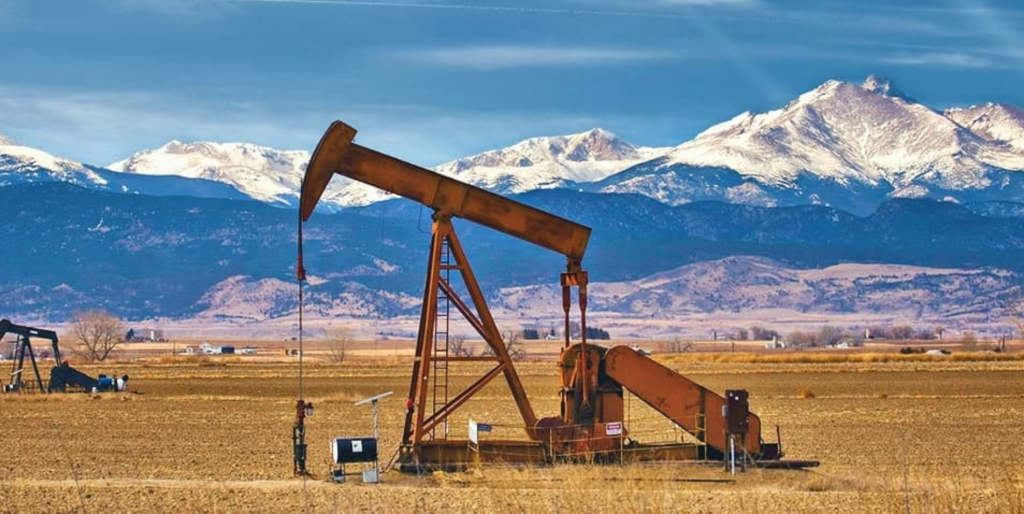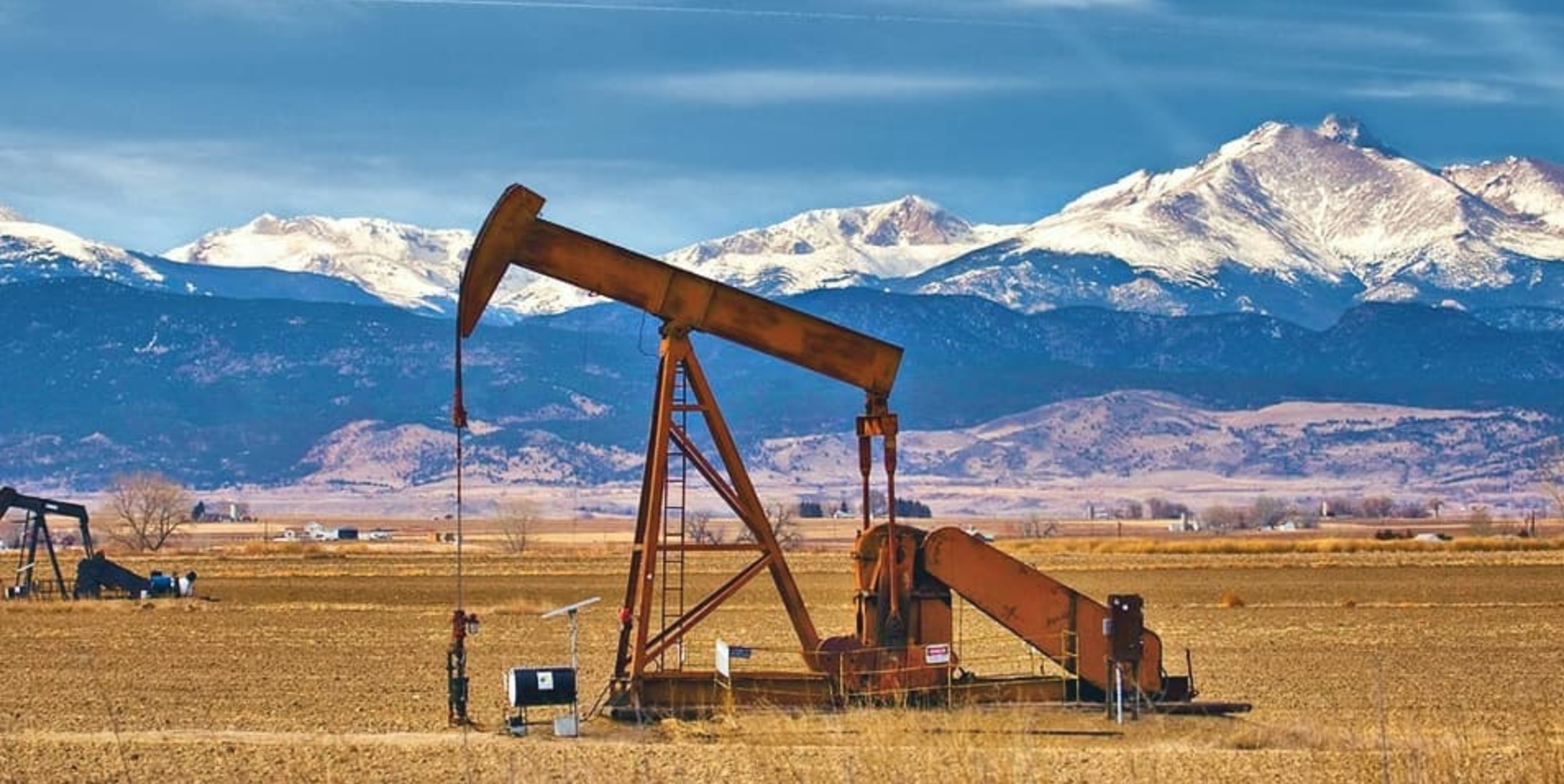By Nick Bowlin, High Country News
Jackson County, Colorado, is not known for oil and gas production. This sparsely populated northern county — population 1,363 — is far from the state’s oilfields on the Eastern Plains, which tap into the huge Denver-Julesburg Basin.
But there is some energy development here, including 110 wells on federal public land. K.P. Kauffman, an oil and gas operator with a history of environmental violations, acquired the wells in 2018 from another Colorado company.
It was a minor transaction, the sort that happens all the time.
One company wants to get older, low-producing wells off its books; another sees in the wells some remaining profit. According to industry experts, however, transactions like this reveal, in miniature, the billions of dollars of accumulated liability created by more than a century of oil and gas extraction in the country. These wells would cost at least $9.6 million for the new owners to clean up, according to Colorado’s average well-plugging costs; other estimates put the amount even higher.
“At no point in the process were companies asked to set aside the true cost for cleaning up these wells,” said Clark Williams-Derry, a finance analyst with the Institute for Energy Economics and Financial Analysis.
Four years ago, K.P. Kauffman acquired the 110 wells from a company called Bonanza Creek. They were not choice assets. At the time, the wells averaged around 32 years old — the oldest were over 70 — and their cumulative production had declined annually since 2011, according to state oil and gas data. About 60% were still actively producing. By 2017, the year before the sale, they were averaging less than two barrels of oil (BOE) per day. Below two BOE per day, a generally accepted industry standard, wells are often considered to not be economically viable.
Bonanza was aware of this decline. In its 2014 year-end report to the U.S. Securities and Exchange Commission (SEC), it reported a stark drop in the wells’ value. The company’s estimate of their worth in a sale had fallen to zero dollars. Even so, Bonanza decided to sell. In two financial statements submitted to the SEC in 2015, it stated its intention to get rid of its Jackson County assets.
For whatever reason, though, the sale did not take place right away. In early 2017, Bonanza declared bankruptcy. After some restructuring, it re-emerged a few months later, and, the next year, successfully sold the 110 wells for $100,000 and “full release of all current and future obligations” — meaning the legal responsibility to plug the wells. For 110 wells, $100,000 isn’t much. By comparison, drilling a single new, highly productive fracked well in Colorado could cost about $6 million today, according to an analysis of market data by Williams-Derry.
Since the sale K.P. Kauffman has not plugged any of the wells, which have showed declining net production every year, according to Colorado Oil and Gas Conservation Commission (COGCC) data, including a 19% production drop the year after the transaction. By 2021, the wells averaged a scant 0.37 BOE per day. K.P. Kauffman is unlikely to be making much money, according to a cash-flow analysis by Dwayne Purvis, a petroleum engineer for more than 25 years.
“I estimate that these wells were not profitable to operate under normal operating standards,” he said. “An operator might be able to make money on them, but it would require spending little on items like supervision, preventative maintenance and repair.”
So, what did each party see in the deal? For Bonanza, the sale coincided with a period of mergers, culminating in a consolidation with other Colorado drillers into a new company, Civitas Resources, now one of the state’s largest oil companies. The Jackson County wells had been in decline for years, so Bonanza got rid of assets with small value for a small return, or, as the company put it in SEC filings, “minimal net proceeds.”

Bonanza removed the wells from its books, along with, crucially, the requirement that it pay to plug them someday.
As for K.P. Kauffman, it got wells that are still producing oil, even in minor quantities. It got something that will turn a profit in the short-term. In response to a list of questions, a company spokesperson told High Country News: “Our own investigation of these assets at the time of the transfer makes us confident in their value.”
It’s possible that K.P. Kauffman believed it could operate the wells more cheaply — thus profitably — than Bonanza. But even if that were true, Purvis said that, once plugging costs are included, he would consider them a “net liability.”
“Even assuming reduced operating costs at the time of transfer, there was no viable scenario for the wells to generate enough profit in the future to pay for their plugging,” he said. (Purvis is working with Carbon Tracker, a climate think tank, on a forthcoming report about the problem of paying for plugging declining wells in Colorado.)
This appears to be part of K.P. Kauffman’s wider strategy: Low-producing wells make up a significant slice of the company’s more than 1,200 Colorado wells. State data from 2021 shows that 84% of its wells — both active and inactive — produced less than two BOE per day. It’s a business model that appears to rely on not factoring in the true cost of plugging those wells.
This is a national problem: Plugging all the unplugged onshore oil and gas wells in the U.S. will cost at least $280 billion, according to Carbon Tracker. Colorado alone has approximately $8 billion in unplugged wells. A recent study from the Bell Policy Center found that Colorado’s insufficient financial requirements for oil and gas companies leave the state at risk of a taking on a large chunk of that liability, potentially overwhelming the state’s budget.
Nearly all the Jackson County wells are on federal public land, overseen by the Bureau of Land Management. The BLM does not require companies to secure the true cost of cleanup for each well up front. Instead, the agency requires, at minimum, a blanket bond, where a single $150,000 bond covers a company’s federal wells nationwide. But plugging the Jackson County wells alone could exceed $10 million. In a review of the federal leasing program ordered by President Biden, the Interior Department recommended increasing federal bond requirements, but did not address transfers of risky or low-producing wells.
As of March 1, Colorado has implemented sweeping new oil and gas rules that increased financial requirements across the board, including compelling companies to put forward individual bonds on low-producing wells. The new, stronger bonding requirements apply to K.P. Kauffman’s existing wells, along with all other operators. The new rules will ultimately apply to BLM wells in the state, but as of now, they are exempt.
The rules also increase scrutiny on the transfer of low-producing wells, including more stringent financial requirements.
“We can’t stop a private business transaction,” said John Messner, COGCC commissioner in a phone interview, “but they have to meet the financial assurance obligations and every other operator obligations under the (new rules).”
For several years, K.P. Kauffman has been in regulatory trouble with the COGCC. Agency staff have even suggested that the company no longer be allowed to operate in Colorado.
This process began in 2019, when state regulators noted a worrying pattern of spills, leaks and other incidents at K.P. Kauffman’s wells.
The COGCC would subsequently order the company to stop production at 87 wells and remediate more than two-dozen incidents the agency described as “a pattern of violations.” Concentrated on Colorado’s Front Range, they included a leaking flowline next to a high school and spills in agricultural fields. Agency and company also agreed to a $2 million fine in 2021 — more than half was deferred — as well as a plan for bringing the company into compliance.
This June, the COGCC called K.P. Kauffman for a hearing. Agency staff had concluded that the company was not meeting multiple deadlines or fulfilling its agreement. More than 20 spills have been reported since K.P. Kauffman agreed to the cleanup plan, according to agency staff.
Caitlin Stafford, a Colorado assistant attorney general who represented agency staff, said that the company had agreed to clean up 58 violation sites eight months ago.
“Only two of them have achieved completion,” she said. “Two.”
The company’s legal counsel argued that it is trying to comply but has not been given enough time. In a statement to HCN, the company said, “Accelerating our progress on the clean-up work required under the Compliance Plan Agreement is our highest priority.”
The COGCC commissioners criticized the company but ultimately did not revoke its permit or impose immediate fines. Instead, K.P. Kauffman has until the end of the year to meet the compliance plan. If the company does not show progress, “I’m ready to throw the book at them,” said Jeff Robbins, COGCC commissioner, during the hearing. An accountant testifying on behalf of K.P. Kauffman said that imposing the full fine would likely force the company into bankruptcy. This could saddle the state with the cost of plugging many of the company’s wells.
“K.P. Kauffman is counting on the assets producing some oil and gas in the short term, and delaying cleanup in the long haul,” Williams-Derry said. “K.P. Kauffman keeps the profits, its executives get paid, and then at the end of the line, they can go bankrupt if they need to, and say, ‘This isn’t our problem anymore.’
The final bag holders of all of this are the taxpayers.”
“How Oil Companies Endlessly Avoid Cleanup Costs” was originally published July 19, 2022 at High Country News.
Nick Bowlin is a correspondent at High Country News. Email him at [email protected] or submit a letter to the editor.
High Country News is an independent magazine dedicated to coverage of the Western U.S. Subscribe, get the enewsletter, and follow HCN on Facebook and Twitter.




